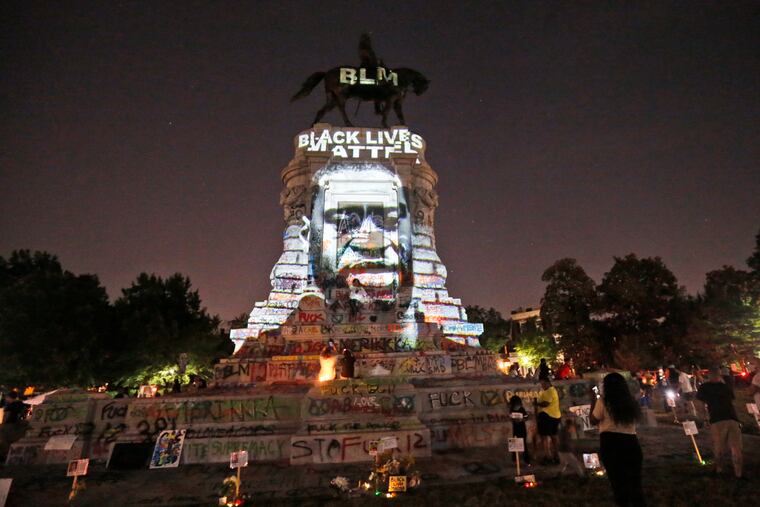Protests prompt U.S. leaders to remove Confederate monuments
Confederate statues were taken down in Louisville and Indianapolis, and the University of Alabama said it would remove campus plaques in response to ongoing protests of police brutality, racial injustice, and the death of George Floyd.

A throng of protesters banged into the Confederate monument in Birmingham, Ala., covering the statue with red spray-paint and chipping away at its base with rocks. One group tried to use a thick green rope to bring down the 52-foot obelisk.
Then their mayor showed up with a megaphone.
“Allow me to finish the job for you,” Randall Woodfin told the protesters on May 31.
Two days later, he made good on his promise: The Confederate Soldiers and Sailors monument, first erected more than a century ago, was gone.
Regardless of what policy changes come next, the nation’s massive protests against racial injustice have already secured tangible victories in several cities. Government officials have taken down at least a dozen Confederate memorials, or pledged to do so in the coming days.
On Monday alone, work crews in Louisville and Indianapolis dismantled statues honoring members of the Confederate Army. Hours later, the University of Alabama said it would follow suit with campus plaques, and leaders in Arizona and Kentucky announced they would begin similar conversations. Early on Tuesday, another spire came down in Jacksonville.
“Our streets are filled with voices of anger and anguish, testament to centuries of racism directed at Black Americans,” Indianapolis Democratic Mayor Joe Hogsett said. “Time is up, and this grave marker will come down.”
In Virginia, the former seat of the Confederacy, a monument in Alexandria came down a month early and Democratic Gov. Ralph Northam ordered the removal of a massive bust of Robert E. Lee on horseback. Late on Monday, a judge delayed that move for 10 days, in response to a lawsuit saying the state had promised to “affectionately protect” the statue.
» READ MORE: The Frank Rizzo statue disappeared last week. Philadelphia is still unpacking its legacy.
But other cities have moved ahead, pushing past whatever historical debates or legal questions may still be standing.
Louisville Democratic Mayor Greg Fischer had long wanted to take down a bronze statue of John B. Castleman, a former major in the Confederate Army considered the father of his city’s parks system.
In 2019, a local arts group had sued to keep the mayor from moving the 107-year-old effigy. But after law enforcement in Louisville killed Breonna Taylor and David McAtee, Fischer said it was time for Castleman’s statue to go.
“The events of the past weeks have shown clearly that it’s not enough just to face our history,” he said Monday. “We’ve got to address its impact on our present.”
In Alabama, state legislators had passed a law barring cities from removing Confederate statues. After Birmingham boarded up the towering obelisk honoring Confederate sailors and soldiers, the city was ordered to pay a $25,000 fine for obstruction, according to AL.com.
Woodfin, the mayor, acknowledged last week while ordering the monument’s removal that another lawsuit could follow. But he was willing to accept that outcome, he said, “because that is a lower cost than civil unrest in our city.”
Just as the 2015 Charleston church shooting prompted a purge of Confederate relics across the South, the ongoing protests have led to a similar sort of mass removals — and seemingly, in record time. Barely a week ago, many of the monuments were still standing, vandalized during the first wave of demonstrations.
In Mobile, Ala., one monument disappeared without a warning. Just days after its sandstone base was covered with graffiti amid the protests, the city quietly removed a statue of Confederate Admiral Raphael Semmes on Friday morning.
“To be clear: This decision is not about Raphael Semmes, it is not about a monument and it is not an attempt to rewrite history,” Republican Mayor Sandy Stimpson said on Twitter. “It is about removing a potential distraction so we may focus clearly on the future of our city.”
A similar argument was put forth by the city council in Rocky Mount, N.C., which voted late on Monday to relocate a statue of a Confederate soldier standing at attention, with the Confederate flag by his side. The monument will be moved from its spot in a park to be permanently placed at a private location.
Reuben Blackwell, a black councilman whose ward includes the statue, said during an emotional testimony to his fellow lawmakers that he could not even bring himself to visit the park where it is located.
“It’s something that memorializes murder to me and to people who look like me, rape to me and [people] who look like me and economic subjugation to me and people who look like me,” Blackwell said, according to the Rocky Mount Telegram.
His son Cooper had led a peaceful rally at the monument last week, and Blackwell said he would not shed a single tear if someone were to pull the statue down.
Then another black councilman, T.J. Walker, spoke up.
His fellow millennials have gotten so fed up with racism and white supremacy, the 27-year-old councilman said, that such a conclusion would not be out of the question.
“If we don’t move it, they will take it down,” Walker said, “and that’s the bottom line.”